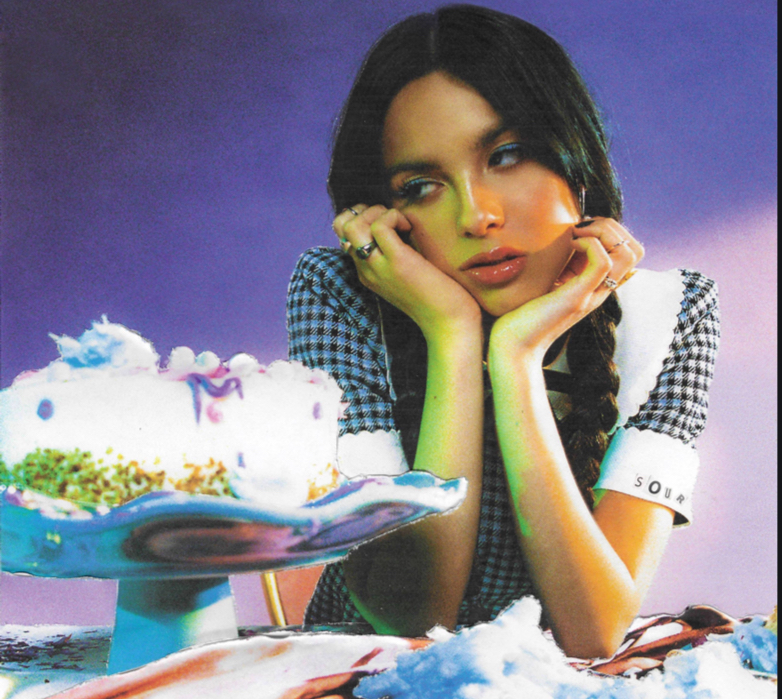Olivia Rodrigo and Her Album SOUR: A Tribute to Breakups
June 20, 2021
“I got my drivers license last week/ Just like we always talked about/ ‘Cause you were so excited for me/ To finally drive up to your house”… You’re singing along in your head too, right? The hit single, “drivers license” was written by the up-and-coming songwriting phenom, Olivia Rodrigo. While it immediately topped the charts, it is easy to forget that this is Rodrigo’s debut single as an artist. Though she had written songs for Disney Channel, (“All I Want” written during her sophomore year & “Just for a Moment” by her and Joshua Bassett, both for HSM: The Musical: The Series), this was an uncharted territory. After releasing DL, she ended up on the top of Billboard Hot 100, which names hit songs from the United States and Canada. Her second single, “deja vu”, was number eight on the Billboard Hot 100 in April … “[making] her the first artist in history to have her first two singles debut within the Top Ten.” Her songs from SOUR have been streamed across various platforms from Apple Music to Youtube to Spotify. All of this, accomplished in the first year as a singer-songwriter. At the age of 18.
Rodrigo has established herself as a force to be reckoned with in the music industry by following her wildly successful debut single with an equally powerful album. It seems that no one can get enough of her brutally honest yet angsty songs because they “seem to be about you and me”, as Rolling Stone puts it. Rodrigo admits that she has studied various artists to improve her technique by listening to their songs on repeat and rewatching their interviews on YouTube.
Taylor Swift, Phoebe Bridgers, Fiona Apple, and Alanis Morissette are just a few of the names that come to mind when Rodrigo is asked about her musical inspirations for this versatile album. When going through the creative process, Rodrigo prioritizes the preservation of her identity through both genuine and detailed narration. She took inspiration from Swift who is well known for doing just this. Rodrigo has expressed her admiration for Taylor Swift by saying “I’m obsessed with the way that Taylor paints pictures and her imagery is fantastic and her storytelling is insane” and “I always try to put aspects of that sort of narrative, singer-songwriter-y lyricism in my songs.” When asked about tips for beginner songwriters, she explains how she writes a song as if they [her idols] were writing the song and how doing so “broadens your horizon and helps make your music that much better.”
Rodrigo strives to stay true to herself as an artist; expressing her authentic feelings to an audience does not make her uneasy. Rodrigo has expressed “I’ve always been such an oversharer. I’ll tell my Uber driver all of my deepest traumas and insecurities, and so I just think songwriting for me is an extension of that aspect of my personality. I’ve never really been so terrified of people learning about the intimate parts of myself; I think that’s what makes songwriting so special.”
In an interview with NME, Rodrigo says, “I try not to write songs through the lens of hoping that they are commercially successful.” To her, satisfactory work does not rely on how its level of success, rather satisfactory work encompasses relatable stories, a combination of genres… and hidden details, such as the whispered “I love you” in the chorus of “deja vu.” Roderigo is determined to release songs she feels proud of, which is part of the reason her listeners say she can’t write a bad song.
While writing DV, Rodrigo references memories with her old boyfriend, post-breakup; including the loneliness felt when watching Glee reruns without her ex and imagining her ex listening to “Uptown Girl” with someone else. Though these details seem minute or less significant than the overarching message, they are conducive to expanding her audience. Why is Rodrigo tactical for using these specific examples? She and her producer’s goal was to increase her listeners and catch professional artists’ attention. She writes about watching Glee reruns to relate her song to FINNEAS, who was part of the show. She writes about “Uptown Girl” to relate her song to Billy Joel.
Several genres synergize to convey Rodrigo’s emotional experience of ending a serious relationship. Seeing as people go through grief, indifference, jealousy, and anger during a breakup, it only makes sense that her songs reflect this. For example, “brutal” comes across with a rageful yet confident tone; it’s high-paced and the lyrics are “all up in your face.” On another note, “traitor” and “enough for u” are much slower-paced and it lets the listeners experience Rodrigo’s vulnerability. The way a person feels when going through heartbreak is not predictable. Neither is her album. Elements of early 2010s pop, folk, and alternative rock appear throughout her album, allowing her to scream “God, it’s brutal out here,” in one song, but also to reflect on her disappointment towards ending a relationship by admitting “Yeah, you said forever, now I drive alone past your street” in another.
